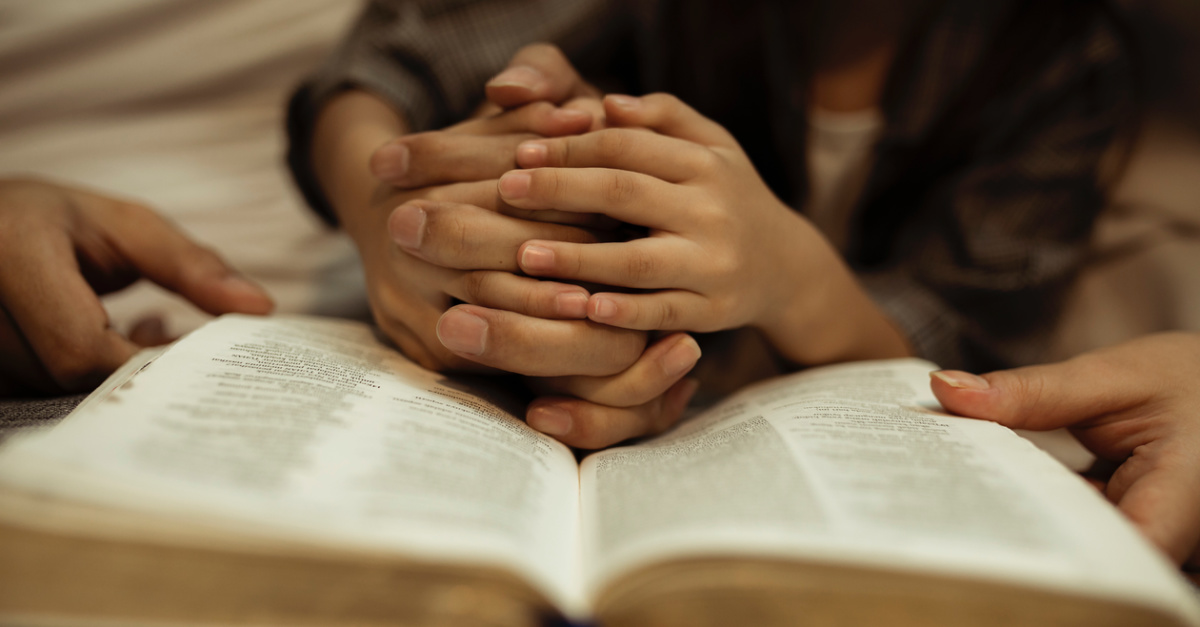How to Help Your Kids with Body Image

Comparison traps are all around us! For our kids, the constant barrage of images and words that press into the developing sense of who they are and their value in the world is staggering.
When the Lord called Gideon to become a mighty force for liberty and justice, Gideon was hiding in a winepress to beat out his grain. He was secretly and desperately trying to survive by preserving a small portion of his harvest instead of handing all of it over to the Midianites. At the time, the nation of Midian sat oppressively over Israel, exacting taxes akin to slavery. When the Angel of the Lord addressed Gideon, he was called a "valiant warrior!" The cowering, nervous, youngest son from the smallest of tribes was called valiant by his Maker.
In many ways, our kids are like Gideon, oppressed by the spiritual battle that rages around them. If they are to become to men and women God has called them to be, we must help them hear the Lord's defining call over the excessive din of the world.
Here are four practical ways to help our kids see themselves the way God sees them
1. Teach them to be aware of who and what defines them
My seven-year-old was deeply upset over a test score the other day. He gets upset whenever he doesn't do as well as he hoped. And he always wants that perfect score. We had a long talk about who and what we allow to sit in our hearts as our Definer. If, or perhaps when, we give that Definer heart space over to anyone other than God, our Maker, it is a sneaky form of idolatry. It was a deep pool of discussion, followed by the shallower waters of hugs, a game, and some mint cookies. But it was the start of many such conversations I know he will need as he forms his sense of value and identity.
Perfection is a sneaky trap of idolatry. It hits us with performance just as much as body image or anything else we can hang our identity on. So much of the development of our sense of who we are and our value, even as Christians, is formed more through worldly influences than through the truth of Scripture. This is very damaging.
As a parent, prayerfully consider how you are pouring Scripture's truth over your child's identity development. Body image is a facet of identity. If they are taught young how to guard their identity with truth, their body image concepts will flow out of that Scripture reservoir. If they are taught to analyze influences in their lives to see how someone or something tempts or threatens a heart space meant only for the Lord, they will be healthier in their sense of body image.
Both boys and girls struggle with body image. However, the struggle doesn't usually start or end with just their physical appearance. So, teaching them to filter the words and influences that they absorb, along with learning to filter their own internal dialogue with Scripture, is a powerful tool that addresses the root struggles that blossom into body image issues.
Gideon's internal dialogue and whole life's perspective were only defined by external experiences. And his experience was one of oppression.
When we see the fruit of the influences of screens and social media in our youth (and this is very different from a physical, occupying military force, but still a very real battleground), we can clearly see that much of what they absorb has been a voice of oppression. Teaching them to filter those influences with awareness is key to navigating this world. Comparison has been an age-old trap for pain and sin (remember Cain and Abel?), but social media has turned the dial up on subconscious comparison opportunities like no other influence I can think of in history. Social media is not the same as a foreign occupying power, but in many ways, we have paid homage to it as if it was. Our kids need us to help them navigate this jungle with the kind of faith that God expected from Gideon. The kind that trusts His word over everyone else's.
2. Model and speak the truth that no matter what changes come, identity and value rest with our Maker

When we compare another group of young men in perhaps even more dire straits, we see that how we define life and our place in it doesn't need to be confined to what we can see.
When Shadrach, Meshach, and Abed-nego were young, Israel was again oppressed by a foreign power. Israel's brightest and best-looking elites were kidnapped and pressed into the king's palace service. This was meant to leave a sense of ruination to the people of Israel. Their daughters were often taken as concubines, and the boys made eunuchs. This was routine practice in history. When Babylon and other powers throughout history came into a land and conquered, they frequently removed the people from their homeland and only left a remnant of the poor in the land. It isn't expressly stated that these boys became eunuchs, but they were kidnapped and made slaves to the king, which would have been traumatic and identity rattling. It is possible they were disgraced by becoming eunuchs, but it isn't a solid fact. Their Hebrew names were removed, and they were given Babylonian names to honor their pagan gods. Most certainly, every facet of their identity would have been affected.
After they were settled into this new life and God's hand of blessing was making them a light to this pagan people, King Nebuchadnezzar signed a decree insisting everyone worships a golden idol. The three young men would not participate. The penalty was death in a furnace so hot it consumed the guard who threw them into it! When the king angrily sentenced them, this was their reply:
Shadrach, Meshach, and Abed-nego replied to the king, "O Nebuchadnezzar, we do not need to give you an answer concerning this matter. If it be so, our God whom we serve is able to deliver us from the furnace of blazing fire; and He will deliver us out of your hand, O king. But even if He does not, let it be known to you, O king, that we are not going to serve your gods or worship the golden image that you have set up." Daniel 3:16-18
Miraculously, God stood by their side and rescued them. They didn't even smell smoke on their clothes when they came out of the fire. Like those three Hebrew youths, our children need their identity secured in truths that go beyond what they can see, feel, and hear.
3. Body changes are uncomfortable no matter who you are or your age - so you aren't alone!
While we pray over and teach our kids about the identity fundamentals such as being aware and purposeful about who/what they allow to sit as Definer in their heart and the truth that they are defined by more than just what they can see or feel at the moment, there's also Paul's words of wisdom for the less extreme situation that comes to all people regardless of whether or not a foreign nation rips every sense of identity from your people - and that situation is body image and aging!
Paul reminds believers that our outer person decays as we age, but our inner person is still renewed in Christ (2 Corinthians 4:16). Speaking that truth to our children is vital. No matter who we are, our bodies change, often in ways that can be uncomfortable because, in general, change is just that - uncomfortable. Teaching our kids to be comfortable in their own skin starts with how we model that for them. It doesn't really matter if it is the discomforts of transitioning from childhood through puberty or changing hormones of menopause or the changing of one's body from the touches of age - all of it is hard. Being honest about that and leaning into God's truth for it for ourselves will make us vessels of usefulness for others sharing the struggle of being human and being uncomfortable with the realities of our bodies changing!
This can be accomplished in simple, natural moments of conversation. We can be sure to speak truthful things about ourselves when we look in the mirror. Even when we don't love what we see, we can tell ourselves the truth of how God sees us out loud as an example for kids. We can be sure to speak about the beautiful way an elderly woman's soul shines out her eyes with love and grace (the most beautiful women I've ever known have been these kinds). We can esteem the friendship and gifts of those we know who have various disabilities. Not having your body work the way you want is a very heavy burden, yet it does not define that person in their heart. None of us knows if we will ever be called to partake in that kind of struggle. Fostering a heart that values people for who they are inside is part of cultivating a healthy and truthful body image. As C.S. Lewis said, God made us souls with bodies, not bodies with souls. We must set a higher premium on the inner person as an example for our children.
Some years back, while I was teaching at a multigenerational women's retreat, a mom said to me, "I can believe all these Scriptures for the girls, but not for me." She shared that she had struggled with eating disorders and had surgery for her body image concerns. She said the verses applied to people who hadn't altered themselves, and she couldn't wrap her belief around them for herself. I will never forget her saying that to me!
The whole of Scripture's story is about reaching and redeeming that which seems too far gone to repair. Our body image might have been dragged through quite a lot, maybe it's even our own doing, but it isn't somehow outside God's redemption and truth. As moms, grandmas, and just simply as women (or men), it is vital that we open the doors of our hearts to God's work in this facet of our lives because the younger ones are watching. How we live out God's love, grace, and truth matters! Our identity and the way we communicate our sense of body image is a very personal and practical way we communicate all God has done in us!
4. Lastly, listen to the specifics of your child's heart and search Scripture for them.

Have Scripture ready to wash their heart and mind with.
And do not be conformed to this world, but be transformed by the renewing of your mind, so that you may prove what the will of God is, that which is good and acceptable and perfect. Romans 12:2
When I was in middle school, there was a really neat girl who was a competitive BMX bike racer. She was feminine in her own way, but the kids made fun of her because she was really strong. She had very muscly arms from all the practice. I danced ballet, so I had sort of wispy arms. And I had no salve for her, except to be kind when others weren't. Now, I have a hobby farm, and I have the arms to go with it. One day when I was thinking about getting rid of the shorter-sleeved tops in my closet and feeling less than great about these changes, I remembered the verse "she girds herself with strength and makes her arms strong" (Proverbs 31:17). I wish someone would have told that sweet girl back in middle school that God loves strong girls - especially strong-armed ones! And for those of us who have lifted umpteen car seats and are sporting Proverbs 31 arms, we ought to embrace our maturing changes with gratitude and joy. It is part of living out loud God's word!
Each of our kids will have a unique take on their body image and identity journey. It's part of becoming their own, grown-up individual selves! So, ask God to give you insight into what each of your kids or grandkids needs to have tucked into their hearts. Maybe your daughter needs to know that verse about strong-armed women. Maybe your son needs to know that he was made by God and to embrace his stature as part of God's handiwork.
There's no formula for this development process. But one thing that seems pretty universal is that the younger generation has more pressure than previous generations on their identity development. As parents and grandparents and people who simply care about kids, we need to be praying for them! We need to have God's Word and grace soaked into our lives so we can share real, alive, active truth with them about these personal topics. They won't believe us when we tell them how God made them amazing, beautiful, and unique if we don't believe it ourselves. So we have to do the work first - or rather, we have to let God do the work in us first.
Photo credit: ©GettyImages/Wavebreakmedia
Originally published March 23, 2022.





